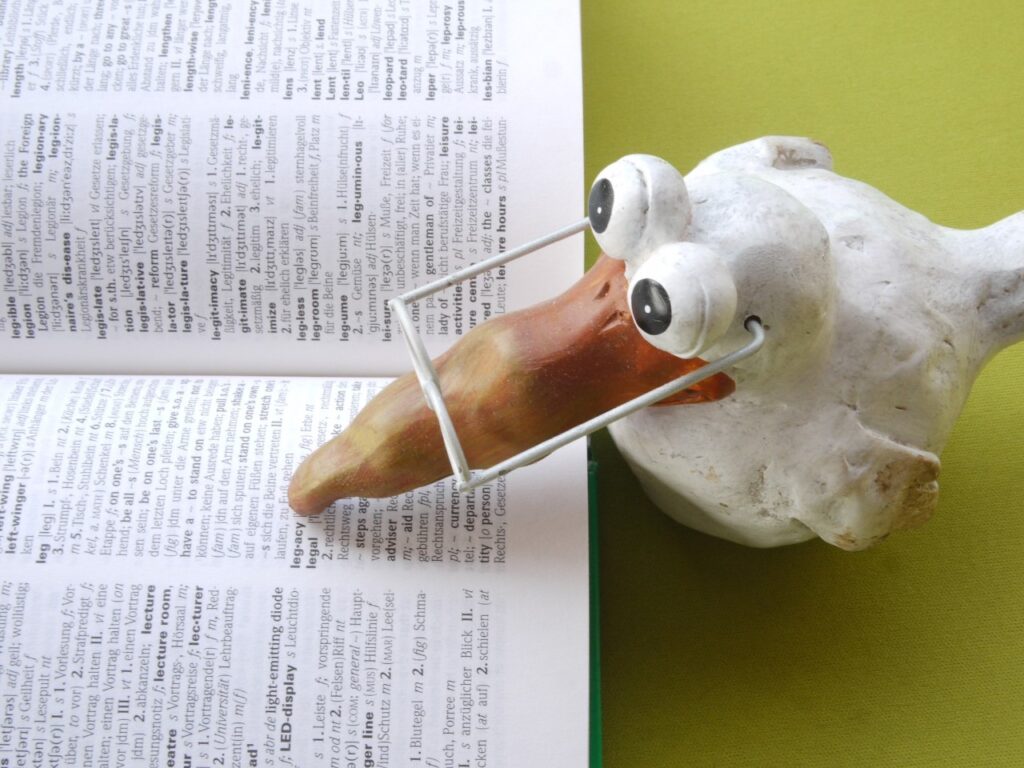
All those stereotypes you struggle against? Dig them out and brush them off, because of course the German language invented the most complicated, somber, interesting words for life in a pandemic. And French added the most nuance. And Spanish emphasized sociability. As for us? Quite a few of our neologisms sound like a spoiled kid pouting.
Granted, the Germans are frank about their misery, too. They added coronamüde, to say how utterly tired you are of COVID, and impfneid, to admit your stinging envy of those already vaccinated. But they also added Kuschelkontakt, or cuddle contact. More intimate than a pod, this is a person you agreed to meet for cuddles. Your other friends stayed six feet away if you met for an Abstandsbier, or “distance beer.” And God help the careless person who busses your cheek with a Todesküsschen, a “kiss of death.”
I love the German word mitdenken, which is more than brainstorming; you are thinking together, as a team, for a common cause. (You know, the thing we did not do here.) And Geisterspiele is downright poetic, describing the “ghost games” played without spectators. “It is sport without a heart,” sighed the weekly Die Zeit. The word is not new, but it began as a reference to a game in winter fog, the players just spectral wisps of color and the ball invisible. In the pandemic ghost games, the players were inside the stadium, and it was the fans who haunted them, gathering outside and screaming cheers in hope that their team would hear them.
My favorite new coronaword is Hamstern, a verb that means “to hoard”—but not sneakily. No, you just grab stuff, the way hamsters stuff food in their cheeks to munch later. Eight jumbo packs of toilet tissue? Hamsterkäufe, hamster buying. Angela Merkl scolded her people for such behavior, calling it vollkommen unsolidarisch (utterly devoid of solidarity). Still, this is a language that already speaks of kummerspeck—literally, grief bacon. In times of angst or sadness, one eats—and gains weight. And so? Coronaspeck. The fat of fear.
Famous for its compound words, German piled up “Verschwörungserzählung,” its convoluted syllables a perfect representation of all the new conspiracy theories that insisted the virus was a hoax or an exaggeration. In the next breath came the stunning brevity of AHA, an acronym that comprises all the public safety rules about social distance, hygiene, and masks. Eindämmen, to contain or curb, gained new importance as strategy; it means to seal something off by building a dam around it.
The Germans also tossed around an English fusion, “systemrelevant,” meaning “essential to society,” when they argued about the extent of “lockdown,” another word they picked up from us. But they only steal what seems apt and efficient; they have more than five million words of their own, eight times the number in English. Roughly one third of all German words were added in the past century, and there seems to be no hesitation about adding more.
The French are slightly more cautious, but when they do add, they refine. Various stages of lockdown were confinement, deconfinement, and reconfinement, which is much prettier than “Holy shit, we have to shut down again?” The French phrase for what you must now avoid, it being impossible from a six-foot social distance, sounds more like a ballet position: la bise, the kiss. And the hygiene (such an icky word) of public health is summed up as gestes barriers. Quatorzaine melded the French words for “fourteen” (quatorze) and “quarantine” (quarantaine) to indicate a two-week quarantine, which became a septaine when the number of days were reduced to seven. Moderns are impatient; the original quarantaine was a period of forty days, probably stolen from Jesus, who spent that long in the desert, or Noah, when it rained forty days and forty nights. In the Jewish tradition, “forty” is used loosely, to represent a period of trial, probation, or chastisement. Quarantaine did not receive its public-health gloss until the fourteenth century, when Italians reshaped it as quarantena, isolation to avoid disease.
The pandemic also reignited the couvre-feu, source of our word “curfew.” France had not had a curfew since the days of Nazi occupation. Literally, the word means that it is time to “cover the fire,” a medieval safety measure to keep villages from burning down because someone fell asleep with their fire still burning.
The most playful French addition? Jeudredi, which confuses jeudi (Thursday) and vendredi (Friday), because during quarantaine, the days blur. (We just played it straight and said “Blursday.”)
In Spain, the Real Academia Española de la Lengua (Royal Spanish Academy of Language) cracked open its doors, agreeing to consider desescalar, or de-escalate. Easing out of lockdown in stages of desconfinamiento (which may also make its way into the REA dictionary), the Spanish spoke happily of desescalada, the de-escalation of precautions. They also came up with a special word for the need to mute yourself on Zoom: mutearse. And another special word for a birthday party on Zoom: a Zoomleaños.
Our words? Many of them seem a bit whiny. Even the Brits were more demonstrative, using “self-isolate” instead of “self-quarantine” to express the social losses that came with safety. Our nod to the importance of companionship was the “quarantini,” the glum solitary cocktail. We complained of “Zoom fatigue” and “maskne” and spent hours “doomscrolling” or railing about “covidiots.” Which just might be the English language’s finest contribution to pandemic parlance. In Spain, the bozos are covidiota, and Germany, France, and the U.K. all use “covidiot.” Once again, though, German goes us one better, adding the Maskentrottel (mask idiot), whose face covering is slung below their nose.
Language lets us think—and reveals how we think.
Read more by Jeannette Cooperman here.
